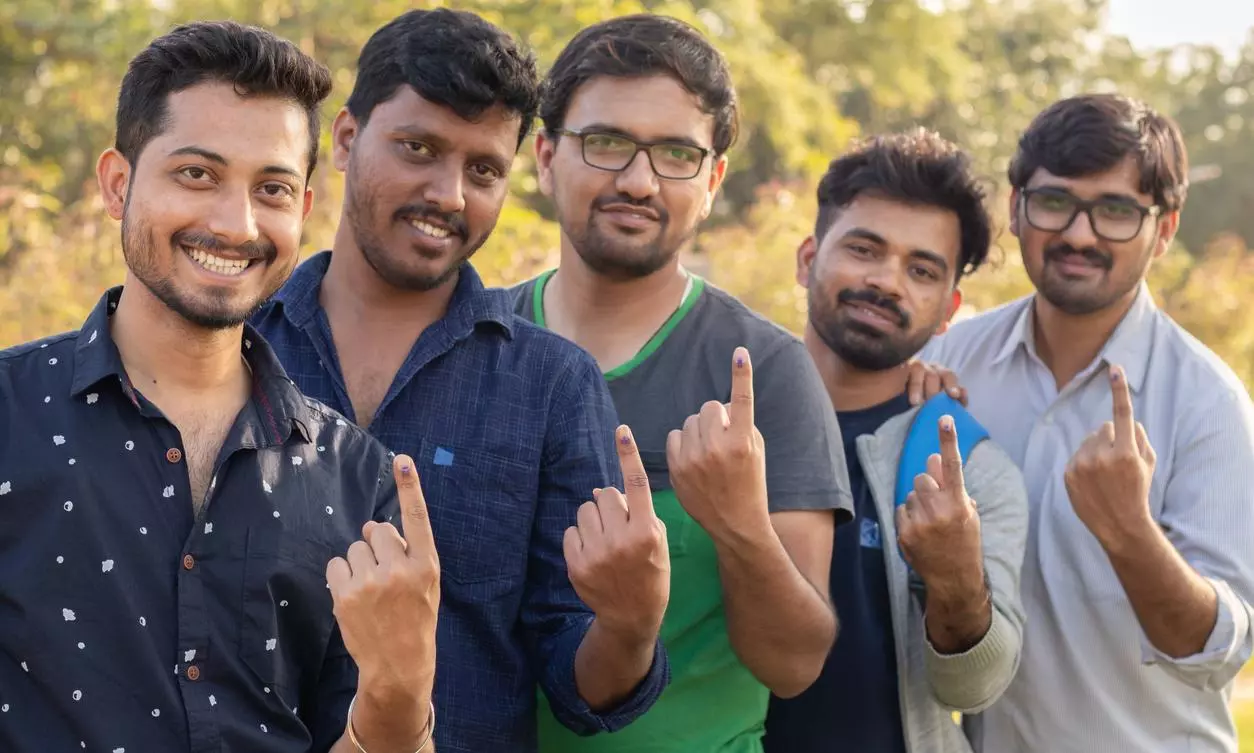
- Home
- India
- World
- Premium
- THE FEDERAL SPECIAL
- Analysis
- States
- Perspective
- Videos
- Sports
- Education
- Entertainment
- Elections
- Features
- Health
- Business
- Series
- In memoriam: Sheikh Mujibur Rahman
- Bishnoi's Men
- NEET TANGLE
- Economy Series
- Earth Day
- Kashmir’s Frozen Turbulence
- India@75
- The legend of Ramjanmabhoomi
- Liberalisation@30
- How to tame a dragon
- Celebrating biodiversity
- Farm Matters
- 50 days of solitude
- Bringing Migrants Home
- Budget 2020
- Jharkhand Votes
- The Federal Investigates
- The Federal Impact
- Vanishing Sand
- Gandhi @ 150
- Andhra Today
- Field report
- Operation Gulmarg
- Pandemic @1 Mn in India
- The Federal Year-End
- The Zero Year
- Science
- Brand studio
- Newsletter
- Elections 2024
- Events
- Home
- IndiaIndia
- World
- Analysis
- StatesStates
- PerspectivePerspective
- VideosVideos
- Sports
- Education
- Entertainment
- ElectionsElections
- Features
- Health
- BusinessBusiness
- Premium
- Loading...
Premium - Events

We must choose not the least bad option but the option that allows us to develop new thinking without such thought being labelled deviant and being crushed
Many tend to make their choice of political party in much the same manner as in which they decide which team to support in the World Cup.
The likes and dislikes of friends and family play a large role. The impression created by a particular leader at the local or the national level makes a difference. Claims and counterclaims of what governments run by the parties seeking their vote have achieved matter.
The media plays a big role in making such considerations available to the voter, modifying the considerations en route. Most of the media hinders, rather than helps.
Choice matters
A first-time voter is making a choice that would help shape his or her future as a member of the wider community, moving in a direction that expands opportunities and freedoms for everyone or shrinks them for everyone. Choosing whom to vote is, thus, very different from choosing which sports team to support.
The political choices before us are far from perfect. That makes it imperative that we choose not the least bad option but the option that keeps the space for choice and experimentation open, so that people can develop new thinking and new ways of organising themselves, without such thought and action being labelled deviant and being crushed. New voters must vote for democracy.
We live in sordid conditions. The air we breathe is polluted, the water must be filtered, roads are congested, good jobs are hard to come by, education is flawed, healthcare is patchy or prohibitively expensive, individual rights and freedoms are circumscribed, for all but a tiny elite, by inherited social structures that divide, inhibit and oppress most of us.
Corruption pervades all walks of life, driving out fairness wherever it reaches. Climate change wreaks havoc, as floods and heat waves, cloudbursts and forest fires, unseasonal rain and drought. Individuals feel powerless before these problems. Hence the popularity of superhuman saviours, whether in movies or politics.
Energy and hope
Yet, everything is not bleak. The demography of the nation gives it youthful energy and hope.
We live in the information age, in which the entirety of human knowledge, creativity and beauty is available to those who search for it, refusing to be submerged in the flood of mindless information and flaky entertainment that pervade cyberspace.
Footloose global capital empowers a section, at least, of entrepreneurs to turn their ideas and dreams into businesses that create jobs and incomes. People can organise around good ideas online. Once a critical mass organises online, they can get active on the ground. This gets a whole lot easier if the democratic space is open, rather than closed.
Promises and funds
Parties promise the moon, literally and figuratively, to win over support. State-supported welfare handouts for all, national glory, government jobs, guaranteed prices for farmers, expanded outlays on education and healthcare, special support for people from traditionally disprivileged communities, elimination of corruption, empowerment of women, housing for all, and so on.
There is only so much money at the disposal of the government, comprising tax collections, borrowings and some non-tax revenues such as dividends of public sector enterprises, licence and spectrum fees in telecom, mineral royalties, fees for registering property, user charges on some government services, interest payments on past loans extended.
In India, this totality, for the states and the Centre combined, is around 27-28 per cent of the entire value produced by the economy, known as the gross domestic product or GDP. In contrast, rich-world governments spend anywhere between 40 per cent and 50 per cent of GDP – or even more in some European countries.
Big-ticket spends
India faces a hostile neighbour to the north, with large, sophisticated armed forces. As a result, India has to spend on defence in excess of what it would like to.
Interest payments on past borrowings exceed 5 per cent of GDP for the Centre and the states combined. Salaries and pensions pre-empt another 1.5 per cent of GDP.
In consequence, less than a fifth of GDP is what the governments at the Centre and the states have on hand, to fulfil electoral promises and meet the varied expenditure expectations from different groups and sections of society.
Promises to spend 6 per cent of GDP on education and 4 per cent on healthcare have to be judged against this reality.
Key questions
Do we, as citizens, have any say on how this money is spent? Is offering ever-increasing minimum support prices, detached from achievable efficiency norms in production, to procure yet more grain to add to overflowing state granaries a better way to spend money than improving village schools and sewerage networks in towns?
Is state-funded rental housing better for India’s migrant workforce than building people permanent homes in the village? Is direct provision of healthcare by state hospitals a more effective way of delivering healthcare than state-funded health insurance? Or, should private care capability be harnessed via managed care?
Are subsidies to industrialists to start high-tech ventures superior to investing the same amount in university research to advance knowledge, create intellectual property, and produce a large army of competent researchers?
Governance choices involve expertise beyond what elected representatives directly possess. Yet, it is for our representatives to summon the experts, hear what they have to say, assess trade-offs, and make choices that best serve the people.
Democratic governance
Much of democratic governance can happen in committees of legislators, if the results of their deliberations inform government action. That again calls for democracy.
Passing laws without debate, cutting legislative sessions short and banning Opposition members have become routine in the present government. These practices are antithetical to democracy and suit the heroic saviour model better – he knows best and the only purpose the legislature serves is to complete the formality.
India is the world’s largest recipient of incomes remitted home by migrant workers abroad. How would an Indian working or studying in a foreign land like to be treated by those around them? Can we, in turn, treat people in our own midst with the discrimination we would hate to face while abroad?
Democracy, we must appreciate, is not the will of the majority at a given point of time – that is majoritarianism. Democracy tempers the will of the majority with certain inalienable individual and group rights.
The Indian example
The caste system is an oppressive hindrance to democracy. But that is not the only inheritance from Indian tradition.
An approach to spirituality that sees as equally valid every path to deliverance is also part of our legacy; and that is ideal for multicultural coexistence. India could set an example for the entire globalising world, with our culture of acceptance of religious diversity, going beyond tolerance.
Instead, political practice in India is turning to exclusion of minorities, and seeking to kick out India’s traditional capacity to subsume difference as special cases of an overarching generality and put in its place the narrowness and cruelty that, in medieval times, inspired the Spanish Inquisition, or underlies, this very day, blasphemy laws in Pakistan.
Not just minorities
Sectarian politics obviously harms the minorities. But it also harms the majority, in multiple ways.
The arbitrariness of state conduct, deviating from equal treatment of all citizens, that is necessary to oppress the minorities will consume not just the minorities, but the less empowered sections of the majority as well. And even for the most empowered of the majority, oppression is like riding a tiger: at some point, the tiger could turn around and devour you.
For young Indians, the goal should be to realise their potential as human beings. Individual striving is part of the project, but decent schooling or a road from the village to the school are possible only as part of collective empowerment.
Democracy is the political framework most conducive to empowerment and collective action to remove the assorted constraints on achieving individual excellence.
(The Federal seeks to present views and opinions from all sides of the spectrum. The information, ideas or opinions in the article are of the author and do not necessarily reflect the views of The Federal.)


